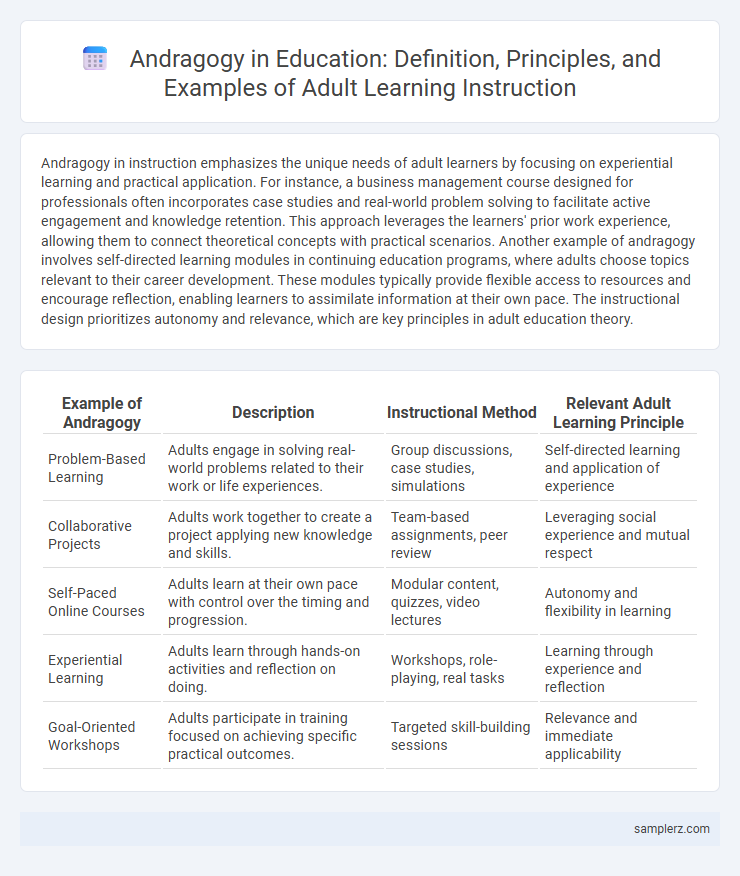Andragogy in instruction emphasizes the unique needs of adult learners by focusing on experiential learning and practical application. For instance, a business management course designed for professionals often incorporates case studies and real-world problem solving to facilitate active engagement and knowledge retention. This approach leverages the learners' prior work experience, allowing them to connect theoretical concepts with practical scenarios. Another example of andragogy involves self-directed learning modules in continuing education programs, where adults choose topics relevant to their career development. These modules typically provide flexible access to resources and encourage reflection, enabling learners to assimilate information at their own pace. The instructional design prioritizes autonomy and relevance, which are key principles in adult education theory.
Table of Comparison
| Example of Andragogy | Description | Instructional Method | Relevant Adult Learning Principle |
|---|---|---|---|
| Problem-Based Learning | Adults engage in solving real-world problems related to their work or life experiences. | Group discussions, case studies, simulations | Self-directed learning and application of experience |
| Collaborative Projects | Adults work together to create a project applying new knowledge and skills. | Team-based assignments, peer review | Leveraging social experience and mutual respect |
| Self-Paced Online Courses | Adults learn at their own pace with control over the timing and progression. | Modular content, quizzes, video lectures | Autonomy and flexibility in learning |
| Experiential Learning | Adults learn through hands-on activities and reflection on doing. | Workshops, role-playing, real tasks | Learning through experience and reflection |
| Goal-Oriented Workshops | Adults participate in training focused on achieving specific practical outcomes. | Targeted skill-building sessions | Relevance and immediate applicability |
Practical Application of Andragogy in Adult Learning
Adult education leverages andragogy by emphasizing real-world problem-solving, where learners actively engage with relevant tasks that connect theoretical knowledge to practical scenarios. Instruction often includes collaborative projects, case studies, and experiential learning to foster critical thinking and immediate application of skills. This approach enhances motivation and retention by aligning educational content with adults' professional and personal life experiences.
Real-World Case Studies of Andragogical Methods
Real-world case studies in andragogy emphasize experiential learning where adult learners actively engage with practical scenarios, such as healthcare professionals analyzing patient case studies to improve diagnostic skills. Corporate training programs often incorporate problem-based learning, encouraging employees to solve authentic workplace challenges collaboratively, enhancing critical thinking and job performance. These methods underscore the importance of self-directed learning, relevance to professional goals, and reflective practice in adult education frameworks.
Collaborative Learning Strategies for Adult Learners
Collaborative learning strategies in adult education involve peer-to-peer interaction to enhance critical thinking and problem-solving skills. Techniques such as group projects, case studies, and discussion forums allow adult learners to share diverse experiences and apply practical knowledge. These methods align with andragogical principles by promoting active participation and mutual respect among learners.
Self-Directed Learning Activities in Adult Education
Self-directed learning activities in adult education emphasize learner autonomy by encouraging adults to identify their learning needs, set goals, and seek resources independently. Techniques such as problem-solving tasks, reflective journaling, and project-based assignments foster critical thinking and practical application of knowledge. These methods align with andragogy principles by promoting intrinsic motivation and accommodating diverse life experiences in instructional design.
Problem-Based Learning: Andragogy in Practice
Problem-Based Learning (PBL) exemplifies andragogy by actively engaging adult learners in real-world problem-solving, fostering critical thinking and self-directed learning. This instructional approach prioritizes learners' experiences and practical knowledge, enabling them to apply theoretical concepts to complex, collaborative scenarios. PBL supports motivation and retention by aligning educational content with adults' intrinsic goals and professional development needs.
Incorporating Learners’ Experiences in Curriculum Design
Incorporating learners' experiences in curriculum design enhances adult education by recognizing prior knowledge and real-world contexts, a core principle of andragogy. Facilitators design activities that encourage reflection, collaboration, and application of personal insights, fostering deeper engagement and practical understanding. This approach bridges theoretical concepts with learners' lived experiences, promoting relevant and meaningful learning outcomes.
Facilitating Adult Learning Through Group Discussions
Facilitating adult learning through group discussions leverages the principles of andragogy by encouraging experiential sharing and critical thinking among participants. This method promotes active engagement, allowing learners to connect new knowledge with prior experiences, enhancing retention and application. Group interactions foster a collaborative environment that supports problem-solving and higher-order cognitive skills essential for adult education.
Peer Teaching and Andragogical Techniques
Peer teaching exemplifies andragogy by fostering collaborative learning environments where adult learners actively share knowledge and experiences, enhancing comprehension and retention. Techniques such as problem-solving discussions and experiential learning align with adult learners' needs for practical relevance and self-direction. Incorporating reflective practice and real-world application deepens understanding and supports lifelong learning goals.
Technology Integration in Andragogical Instruction
Integrating technology in andragogical instruction enhances adult learning by facilitating interactive, self-paced modules that accommodate diverse learner needs. Tools such as learning management systems (LMS), virtual simulations, and collaborative platforms promote critical thinking and practical application of knowledge in real-world contexts. This approach supports adult learners' autonomy and leverages digital resources to foster continuous skill development and problem-solving.
Assessment Methods in Andragogical Classrooms
Assessment methods in andragogical classrooms emphasize self-assessment, peer evaluation, and real-world problem-solving tasks that foster critical thinking and practical application. Formative assessments such as reflective journals, portfolios, and project-based evaluations align with adult learners' need for experiential learning and immediate relevancy. These strategies facilitate continuous feedback and promote autonomy, enhancing learners' ability to connect theoretical concepts with their professional and personal experiences.

example of andragogy in instruction Infographic
 samplerz.com
samplerz.com